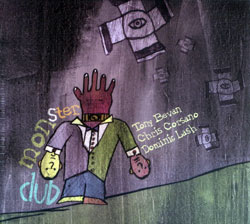
The bombast of this trio was a surprise to this reviewer. I had long come to expect Tony Bevan records to stay within Incus-y territory, with its somewhat dry, detail-oriented British sensibilities (at least as considered within the context of noisy improvised music, of course.) After all, Bevan got his start on that label with the magnificent "Original Gravity," a trio with Greg Kingston and Matt Lewis. And Bevan was in Derek Bailey's stable of frequent collaborators during the Incus patriarch's final years, working with him on relatively "quiet" CD's like "Limescale" and "Good cop bad cop." A previous sax/bass/drums release with which I was familiar, "Bigshots," was, despite its title, largely an exercise in subtleties of interaction and the conjuring of unusual details. In the rare segments on that earlier CD that evoked free jazz tropes, Bevan nevertheless seemed to avoid launching into full-bore "growltissimo" mode.
However, in the early "aughts," Bevan began an association with drummer and Cecil Taylor alum Sunny Murray. Bevan has released two trio records with Murray and bassist John Edwards ("Homecooking in the U.K." and "The gearbox explodes!") on Bevan's own Foghorn label. "Monster Club," I subsequently discovered, is very much in the vein of those earlier recordings. Others listeners, therefore, might be slightly more aware of what to expect from this new release.
Although it is the shortest track on the CD, and the only one in which Bevan uses his soprano sax, "I think that'll be ok..." provides a preview of the approach to interaction this trio seems to prefer. Bevan duets with bassist Lash at the beginning, but his saxophone is already at high volume. Bevan employs a brassy, aggressive tone, with little of the mewling quality that can characterize the soprano. However, Bevan's melodic lines seem to be running roughshod over possible details, and he seems to push the rhythm section to take him on. Soon enough they oblige, and the trio is in full cry for the remainder of the track.
The title track comes next, and though Bevan has moved to tenor, his usual attention to melodic development and detail is more evident. Bevan creates a sense of momentum not merely through the aggressiveness of tone but through his use of phrases. His lines seem to hover outside of the melee of the rhythm section, with Bevan repeating segments with each breath, but adding footnotes, curlicues, and filigrees to the restatements. As the drums become more frenzied, however, the focus loosens in Bevan's playing, and one begins to hear more of the familiar tropes of post-Ayler blow fests.
On the 30-minute "This is murder," Bevan's use of bass saxophone makes the music sound more distinct from, say, that of an average Charles Gayle or early David Murray record. Furthermore, "This is murder" is the most structurally varied piece on the CD. It starts out with an extended section with the kind of playing for which Bevan is better known. Corsano and Lash scrape, saw, and squeak along as Bevan explores the palette of his woodwind behemoth. After something like a thematic statement by Bevan, Lash hops back to his kit and for a bit we are once again transported to the land of Ol' Timey Free Jazz.
But this longest track — and the CD as a whole — breathes. Bevan does not merely wear himself out with "Ghosts"-style squeals and honks. He demonstrates his mastery of the bass sax by exploring the nuances of the horn, especially during the parts where the rhythm section allows him to come up for air. And with the contemplative bass/drum duet in the middle of the track, the stark contrasts within its overall dynamic arc stand out.
Comments and Feedback:



More Recent Reviews, Articles, and Interviews @ The Squid's Ear...


|

